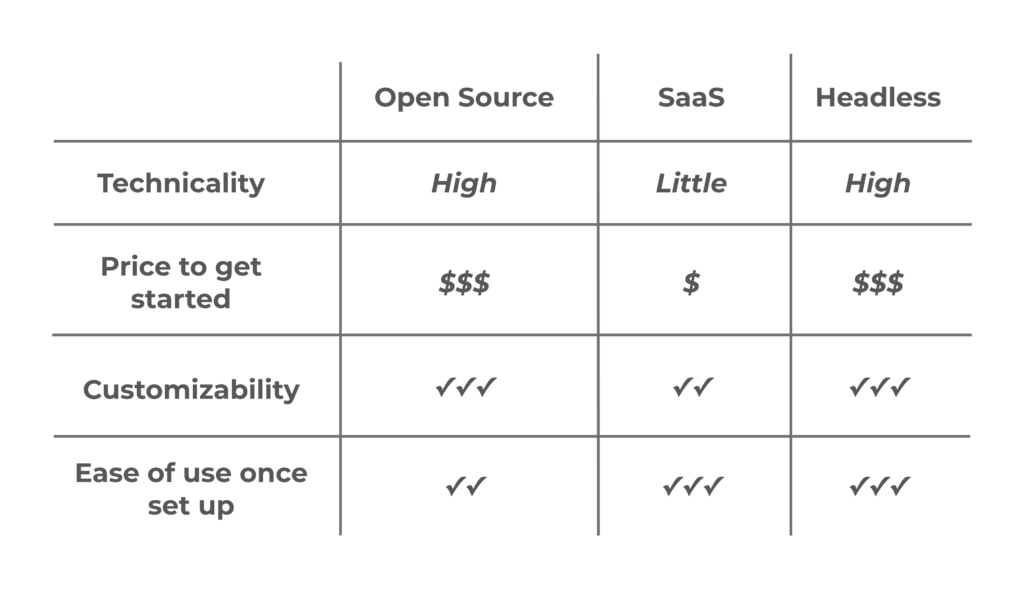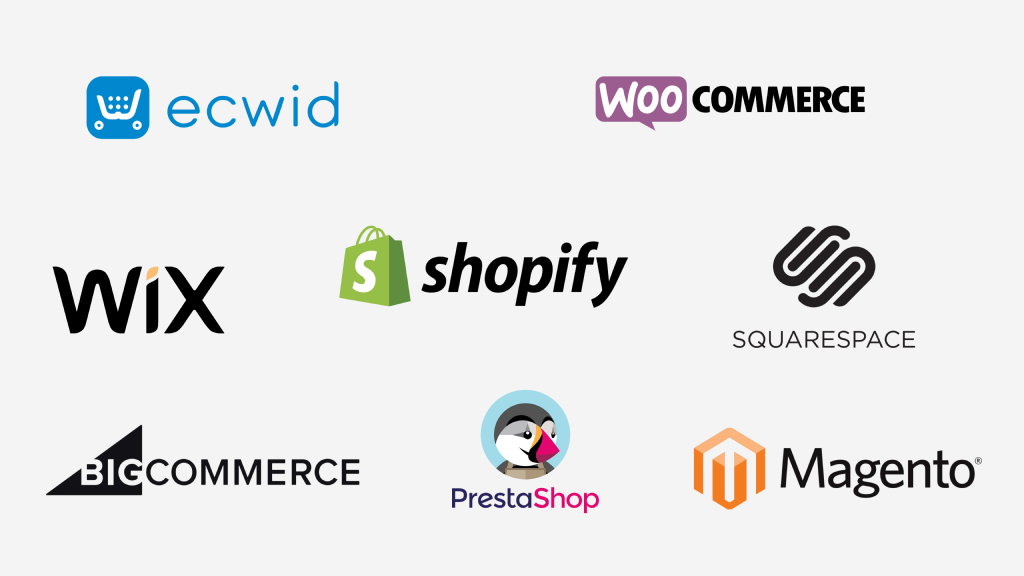Are you a business looking for the best platform to sell online and scale your sales? Many things need consideration when building your webshop and the market can be confusing. Here’s our take on the market, what to think of and why we believe that Shopify in most cases is the best choice.
What is an e-commerce platform?
If you got products to sell and you want to build a webshop, then the next step is to find an e-commerce platform to build your online shop. An ecommerce platform is the software from which you set up and manage everything regarding your webshop. There are many different solutions out there with different offerings and set-ups – some require highly technical knowledge and separate software solutions whereas others are more complete packs including everything from the website builder and the product catalog system to payment processing and order managing.
The three different types of e-commerce platforms
• Open source
• Saas (software as a service)
• Headless commerce
Open source – for the bigger corporations needing a complete custom solution:
Open source platforms let you control and customize everything exactly as you want. However, this solution requires a lot of technical knowledge. Open-source e-commerce platforms are therefore a great choice for tech-heavy companies with internal DevOps teams, as they can be easily tweaked to fit their needs. However, they may not be the best option for small- and medium-sized businesses or those without a development team, as they are highly costly to develop and maintain.
Saas (software as a service) – the easiest and cheapest option to get started:
Software-as-a-Service (SaaS) e-commerce platforms offer the easiest and cheapest complete webshop solutions. Saas solutions are usually subscription based and include the full package to get started – the hosting of the shop, a web builder and they’re easy to use for non-technical users. They bring many templates that are easy to customize but they are still limited if you want a complete custom design.
Headless – the flexible middle solution:
A headless e-commerce platform separates the front-end design layer of the shop from the back-end storage and management of product information. This allows brands to create a completely customized user experience, while still being able to deliver the same content to any device. This approach offers many potential benefits to brands, including speedier loading time, cost savings, and completely custom design. Headless e-commerce is becoming a popular choice for many businesses, as it allows you to use great Content Management Systems and still customize your website exactly how you like it. A headless setup also comes with many upsides in terms of performance, where brands are experiencing high web speed performance and an increased conversion rate.

Things to consider before choosing an e-commerce platform
When you’re starting an e-commerce business, choosing the right platform is one of the most important decisions you’ll make. Here are some key things to consider when selecting an e-commerce platform:
Cost: Most e-commerce platforms charge a monthly subscription fee and/or a transaction fee. Some are cheaper than others, but the cheapest may end up as more expensive in developer money which could have been avoided on another platform.
Complexity: Do you need a fully customized shop with your exact design and complex visual features, or can your needs be met with one of the thousands of available templates already made?
Payment options: It’s important to make sure that the platform you choose supports the payment options you want to offer, such as PayPal, credit cards, and Apple Pay.
Mobile optimization: Many e-commerce shoppers prefer to shop on their mobile devices, so it’s important to make sure that your chosen platform is optimized for mobile.
SEO: You want to make sure that your e-commerce website is optimized for search engine visibility. Look for a platform that offers SEO features, such as customizable metadata, page titles, and automated sitemaps.
Customer service: If you’re less technical, make sure that the e-commerce platform you choose offers customer support when you need it. The best platforms will provide 24/7 support.
Examples of e-commerce platforms
WooCommerce – open source for the wordpress users
If you’re familiar with WordPress then Woocommerce is the plugin that turns your WordPress website into an online store. It’s open source and free of charge but it comes with some limitations and there is no customer service.
Pros:
• Flexible and versatile: Since WooCommerce is open source, it’s an incredibly flexible platform with endless options for customization.
• Familiar for WordPress users: The interface of Woocommerce is very similar to the rest of WordPress making it easy to navigate for people who are used to working with WordPress.
• Affordable: It is free to install and use, and there are a variety of free and paid add-ons available to further customize your store.
Cons:
• Complex setup and maintenance: Setting up and managing a WooCommerce store can be complex. It requires a lot of work to set up and manage, and you may need to hire a developer to customize or maintain your store.
• No customer support: While WooCommerce has an active support forum, it doesn’t offer any official customer service or technical support.
• Slow Performance: WooCommerce can be slow and inefficient, especially if it isn’t properly optimized.
WIX – All in one platform with a very user-friendly website builder (SaaS)
If you’re a smaller business looking for an all-in-one solution and you got few technical skills, then WIX is a great option for you. It offers an excellent drag-n-drop website builder, a complete order and product system and there are many templates to get started with when designing your site.
Pros:
• Easy setup: WIX has a simple drag and drop editor that makes it easy to customize and design your store, even for those with limited technical knowledge.
• Comprehensive range of features: WIX provides a wide range of features, such as integrated payment processing, product management, analytics, and more.
• Affordable pricing plans: WIX offers competitive pricing for its services and features.
• Reliable customer support: WIX offers 24/7 customer support in multiple languages.
Cons:
• Lack of integrations: WIX does not offer many third-party integrations, such as payment gateways, shipping services, and more.
• Slow loading speeds: WIX stores can be slow to load, which could lead to lost customers.
• Limited scalability: WIX is not ideal for businesses that require lots of customization or large amounts of traffic.
Shopify – All in one platform for all business sizes (SaaS/ Headless)
Shopify is another all-in-one e-commerce platform that makes it easy to build an online store and sell products. It is completely theme based which takes away some customization options as standard, but it secures that your website is always showing correctly no matter what screen size or browser you’re using. Shopify offers a huge catalog of third-party apps for your website which are all moderated by Shopify so they’re always safe and functioning to use.
Shopify is also available as a headless solution which adds way more flexibility and agility to your design. This has become an increasingly popular solution as it combines endless customizability options with Shopify’s excellent product and order management system plus their highly trusted payment check-out system.
Pros:
• Easy to use and intuitive interface
• Robust customization options
• Low transaction fees
• 24/7 customer support
• Secure payment processing
• A vast selection of third-party apps and services
• Great SEO features
• Excellent order management system
• Easy integrates with ERP and PIM systems
Cons:
• More costly compared to some other platforms
Magento – the unlimited solution for the bigger corporations (open source)
For the bigger corporations with greater budgets for custom development, Magento is a good choice as it’s open source and comes with many options for customer targeted marketing.
Pros:
• Flexible and feature-rich platform that can be customized to meet the needs of any size business
• Comprehensive catalogue management system
• Easy to integrate with third-party applications
• Highly secure platform with no need to install additional plugins
Cons:
• Steep learning curve for users unfamiliar with the platform
• Unsupported features must be installed via third-party plugins
• Lack of custom themes and templates
• Can be expensive to maintain as it requires a lot of developer hours
Our recommendation for most: Shopify
There is not one answer when asking what e-commerce platform is best – it all comes down to your needs. In most cases, however, Shopify seems to cover the needs the best for most. One of the main benefits of the platform is how easy it is to use in all aspects of running a completely modern webshop. It’s loved for its product-, inventory- and order system and its checkout system is highly trusted by the customers. It’s reliable with an uptime on 99,99% across all Shopify websites in all countries and with your Shopify subscription comes an app store for plug-ins which are all moderated by Shopify to secure that they’re all functioning and safe to add to your website. This is a great advantage compared to other e-commerce platforms with similar app stores without moderation as these plug-ins easily can break the code on your site, make your site less safe for visitors or violate laws such as GDPR which becomes your responsibility once launched on your site.
Underneath the surface, Shopify is built on some highly advanced code bringing many advantages to the users of the system and it saves developing hours for programmers of custom solutions. This involves top protection against hackers, fast loading speeds, compatibility for all platforms, secure payment processing for the customers and much more.
Apart from this, Shopify can also be used as a headless e-commerce platform which brings together the most modern features available for a webshop with endless possibilities for customization. It is the platform that requires the least coding to add special solutions, so if you want custom features for your webshop developed by programmers, your bill is going to be the lowest when working with Shopify.




